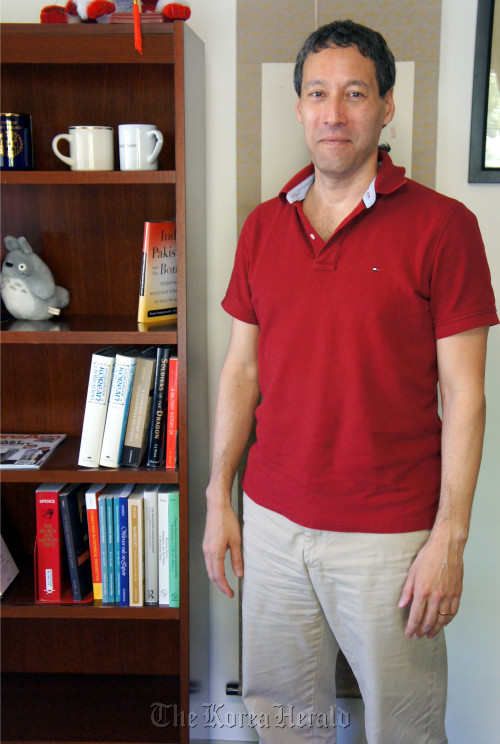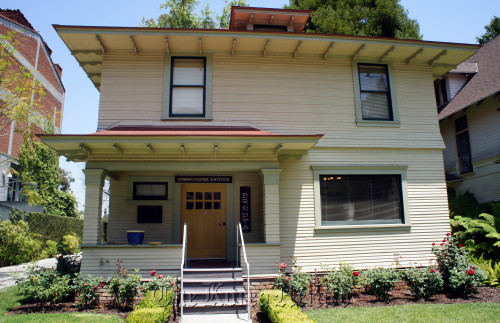Born in California to a family where the only non-Korean was his mother, who was an orphan, Kang said there is “no American side in my family.” He grew up listening to his father’s stories about his hometown in North Pyeongan Province.
“I was always fascinated about the sadness of the division, that we could not go see his hometown. It was always very interesting to me,” said Kang. He began to study Korea more seriously once he entered college.
Kang came to USC as the head of the Korean Studies Institute in 2009 after 13 years of teaching Korean Studies at Dartmouth College in New Hampshire. The institute is starting a minor’s program in Korean studies.
“Here at USC there are a lot of students who are interested in Korean culture, business, politics ... but don’t necessarily want to be professors. They are the ones who will become business leaders, NGO activists or work in the government. So our goal is that if we have a minor degree, they may study Korea and it will help them in their career. Their Korean studies will be helpful because they know it’s an important part of the world,” said Kang.
Being an expert on international relations, business, political science and North Korea, Kang knows how to fascinate his students.
“I can do all these other things like teach ‘Intro to I.R.’ to 150 freshmen. Most of such classes have all the examples from Europe, but my examples concern North Korea and South Korea. So in a very subtle way, they get exposure about Korea,” said Kang, giving a hearty laugh.
Kang is in high demand from governmental organizations and the military to give talks on his views on N.K. and related U.S. policies. He hopes to help, “in a small way,” in improving American policy toward the two Koreas.
“Non-partisan and even-handed, we are the ones who can help the larger American community know what’s going on in Korea. When I go to Korea, it’s going to be helping the Koreans understand what the Americans are doing,” said Kang.
He called the current situation surrounding N.K. a “New Cold War.”
“Right now, my read is that in Washington, D.C., 90 percent of the key policy makers think that isolating them and punishing them is the way to go. They are very annoyed at the North Korea regime, so there’s no real domestic debate about what to do. The U.S. policy right now is ‘strategic patience.’ Wait them out until they buckle. But the thing is, they probably won’t buckle,” he said.
“What we are doing right now ― isolation and pressure ― may work on a nuclear issue. But it will clearly make the humanitarian issue worse. If we don’t give food aid and things like that, the people in North Korea are going to die. At the same time, if we help the North Korean citizens who are innocent like you and me, we can help them but the regime will benefit from it, even slightly. And when it’s that complex, the U.S. president is not going to waste political capital trying to solve the problem.”
Given that it is not clear what else they can do, and based on his views that N.K. meets pressure with pressure of its own, Kang said that adding more pressure is counterproductive. In the short-term, he is in favor of providing humanitarian food aid.
“I am not going to just say ‘Fine, let them die.’ The weakest, poorest, the most vulnerable people are going to die. Even if the regime takes 30 percent of the food, 70 percent will go to the people who need it. There are ways that you monitor it and there are NGOs right now, today, in North Korea, giving 100 percent of aid under full monitoring,” said Kang.
He said that the N.K. regime is fairly stable but if it does collapse, it will be after Kim Jong-il dies and Kim Jong-un takes power.
“He (Kim Jong-un) is going to have to deal with palace politics and factions and every decision he makes is going to have to be right. As long as he’s OK, or the real ruling group, the advisors, can stay coherent, it should be fine. But if he makes some big mistakes, then I think you could see him get vulnerable very quickly. That’s when it could happen. It is going to look incredibly solid until it looks incredibly chaotic,” said Kang.
He is currently on his second year of a research project called “The Korea Project, Planning for the Long Run” with his rival/colleague Victor Cha, director of Asian Studies at Georgetown University whose conservative views on N.K. are often contrasted with Kang’s liberal views.
“Victor has a more politics-focus and conservative focus. And I have a more academic, theoretical focus and I’m a little more Democrat. And it’s good, really productive. I make him less serious and he keeps me from saying too-outrageous things,” said Kang.
The project is not on how unification would occur, but on the inevitable problems that would occur after unification, said Kang. They had experts from around the world write papers on their experiences, paired them with North Korea experts and held a conference to talk about how they apply to North Korea.
“No matter how unification occurs, you’ll have to deal with public health system, environmental cleanup, reform the market economy, migration issues, education reform ... And we know from Iraq and Afghanistan that bad planning makes things worse,” said Kang.
Although the big concern in South Korea and China is that there will be an exodus of millions of North Korean refugees in the event of a collapse of the North, that might not be the case.
“Our anthropologists who have worked with North Korean refugees and demographers from Ethiopia and Bosnia, say that migration is going to be probably much, much lower than you think. If there is even minimally adequate food, people don’t want to leave their homes. Even when bullets are passing over their heads, they are like ‘I’m going to wait, it will get better,’” said Kang.
“We may be focused on the wrong problems. We should still think about it, but it could be much more on if we can provide adequate, immediate stabilization in North Korea, not on big camps in South Korea.”
By Park Min-young, Korea Herald correspondent (
claire@heraldcorp.com)









![[Today’s K-pop] Blackpink’s Jennie, Lisa invited to Coachella as solo acts](http://res.heraldm.com/phpwas/restmb_idxmake.php?idx=644&simg=/content/image/2024/11/21/20241121050099_0.jpg)